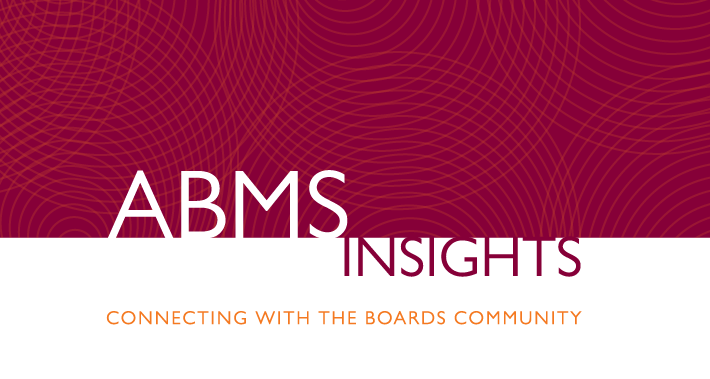
Promotes Quality and Safety Culture, Creates QI Alliances
The American Board of Medical Specialties Portfolio Program (ABMS Portfolio Program™) ties organizational quality and safety goals to continuing certification, benefiting health care organizations committed to quality improvement (QI) and physicians involved in those efforts.

ABMS’ Senor Vice President of Certification Standards and Programs
“By participating in the Portfolio Program, Sponsor organizations can award physicians continuing certification credit for engaging in QI initiatives, but the program offers so much more than that,” noted Greg Ogrinc, MD, MS, Senior Vice President of Certification Standards and Programs at ABMS. “The Portfolio Program promotes a quality and safety culture within Sponsor organizations and helps create stronger alliances among quality-centric organizations across the country.”
Currently, more than 90 Sponsor organizations participate in the Portfolio Program. They range from academic medical centers, hospitals/hospital groups, accountable care organizations, and community health centers to medical specialty societies, consortiums/collaboratives, physician organizations, and governmental agencies. “Any health care organization that engages physicians in QI work and has the means to implement a successful Portfolio Program is eligible to apply,” said Teena Nelson, ABMS’ Portfolio Program Manager.
QI projects can address processes, clinical care, provider wellness, administration/systems, or population health. (See Top Ranked QI Project Topics.) The Portfolio Program has created four activity templates that can be used to submit QI work related to COVID-19, health disparities, opioids, and telehealth. Topics for additional templates are being considered as the templates have been popular among participants, she added.
Last year, the Portfolio Program revised some requirements, offering greater flexibility and allowing for increased innovation by Sponsors. Among them are:
- Offering credit for physicians in QI/patient safety leadership roles and a one-step submission process,
- Reducing the number of required Plan-Do-Study-Act/intervention cycles from two to one,
- Accepting education as a sole intervention on the QI activity form, and
- Streamlining the process to offer credit to external participants.
“These revisions were designed to reduce administrative burden and expand physician engagement,” Nelson said. They were made based on feedback from Sponsors, ABMS Member Board Executives, and other program stakeholders.
Many Sponsors align their Portfolio Program QI initiatives with their organization’s strategic and quality goals so that physicians can receive continuing certification credit for engaging in quality work that is mission critical to the organization, Dr. Ogrinc noted. Additionally, physicians can identify QI work within their own practice that can be addressed through a Portfolio Program QI project. “Either way, physicians are actively participating in QI work that supports their organization, their patients, and their own individual certification needs,” he said. Physicians benefit when an institution has a mechanism in place to address QI work because it saves them valuable time searching for meaningful QI projects and engaging in administrative work to complete them. “They are rewarded on two fronts: seeing the benefits of the QI work in their daily practice and being awarded continuing certification credit for their contribution,” Dr. Ogrinc added.
The Portfolio Program supports and encourages interprofessional, multi-disciplinary, and cross-departmental collaboration within an organization. Since 2017, physician assistants (PAs) have been awarded continuing certification credit from the National Commission on Certification of Physician Assistants through an agreement with the Portfolio Program.

ABMS’ Portfolio Program Manager
The Portfolio Program also serves as a hub to connect departments in myriad ways. For example, an organization’s Portfolio Program may be housed within the continuing medical education/continuing professional development office, but also closely collaborates with the QI department to determine which initiatives are eligible for credit, Nelson explained. Oftentimes, the program coordinates with credentialing to ensure outreach to physicians and PAs who need certification credit each year. It frequently works with the information technology department to identify available data and publicly reported measures for incorporation into QI projects.
The Portfolio Program has been pivotal in cultivating a community of quality-centric organizations that spans across the country. “Portfolio Program Sponsors consistently state that having access to colleagues nationwide is one of the greatest benefits of the program,” Nelson said. The Portfolio Program staff at ABMS host monthly calls as well as provide a quarterly newsletter and periodic program updates. “These touchpoints give Sponsors numerous opportunities to share resources and camaraderie, make strategic connections, and receive advice and feedback from other Sponsor organizations,” she added. Sponsors also have access to a shared web-based tool called Sponsor Central that allows them to carry on conversations and share documents.
In addition to engaging with like-minded organizations, Portfolio Program Sponsors have unique opportunities to connect with staff from the ABMS Member Boards community through various calls, meetings, and conferences during the course of each year.
Being a Portfolio Program Sponsor not only can improve patient care, it can improve the bottom line. The University of Michigan, a Sponsor since 2011, conducted an extensive return-on-investment analysis in 2020 and determined participating in the Portfolio Program saved the health care system nearly $900,000 annually in physician time alone. Between 12 and 15 QI projects are implemented, with anywhere from 134 to 259 physicians participating for credit annually, at the University.
“The Portfolio Program has made a dramatic and important impact on QI at Sponsor organizations,” Dr. Ogrinc concluded. “More importantly, it has helped encourage physicians to engage in meaningful practice changes that have improved the health care provided to patients and communities across the country.”
© 2021, American Board of Medical Specialties
